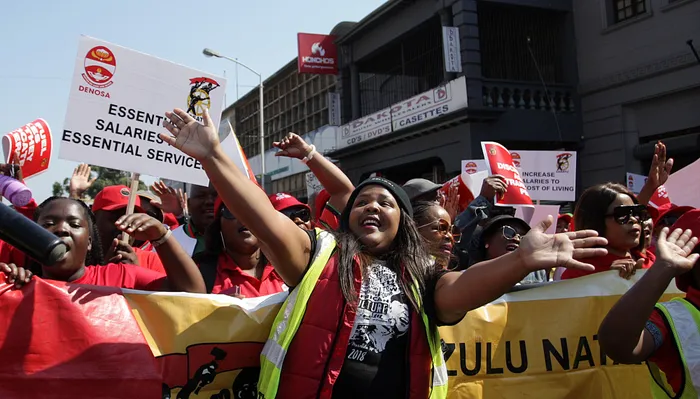COLUMN: Relationship between unions and ANC government stifles job growth

SOUTH AFRICA - ANAPIX - Durban - 24 AUGUST 2022 - Thousands of Cosatu, Saftu Denosa and its affiliations members marched to Durban City hall to hand over a memorandum against high price of fuel , food and unemployment during the national shut down in the Country. Picture: Bongani Mbatha: African News Agency /ANA
The latest unemployment figures have shown the South African situation has gone from bad to worse.
Most of us are punch drunk and almost oblivious to the ongoing pain unemployment is causing each and every single South African family.
For the past 20 years, the country has been bleeding jobs and very little has been done to stem the tide.
We should not only be stopping the destruction, but turning the situation around. There are many ways the government could tackle the job crisis, but every time a solution is suggested, it is either ignored, or reasons are given as to why they don’t want to even try.
The unhealthy relationship between the trade union movement and governing party, the ANC, is part of the problem. The trade unions, understandably, want to protect their members already in jobs and want to improve their working conditions and salaries.
Often this push for improved conditions renders it impossible to create more jobs and expand the workforce. Evidence has clearly shown that minimum wages do just that. Archaic onerous regulations are stifling businesses and, in particular, small businesses.
Informal business has soaked up the unemployable – people who don’t have qualifications, education or a history of previous employment. This sector trains these employees, giving them a stepping stone into formal jobs. But notoriously, the informal sector is heavily stifled in South Africa.
Our regulations and harsh labour laws effectively close down informal production units and trading businesses. Clearly, if a spaza shop faces the same laws as a retail business registered on the stock exchange, there is no competition. The fledgling spaza shop will struggle to survive. All of South Africa’s neighbours have a thriving informal sector because they are effectively left to get on with it.
The Western Cape has shown us in this last quarter that over 50 000 jobs were created in manufacturing; 35 000 in construction; 30 000 in transport, and 15 000 in agriculture.
The secret is simple. The provincial government is standing behind the business community, to ensure they not only survive, but thrive. This needs to happen in every province. We need a national government that will stand with the business community so they can create more jobs. Even the ANC has acknowledged it is not government that creates jobs but the private sector.
The public service is not going to be able to create more jobs – more recently it has declared it cannot pay the increases demanded and will have to consider retrenchments. In other words, the only way to start employing more people is through the private sector, and in particular, through small businesses and the informal sector.
The Fourth Industrial Revolution means big business will be leaning more and more towards computerisation and mechanisation – and thus retrenchments. These businesses have started speaking to their trade unions over the past three months. Very few industries will be showing growth unless the national government is replaced or there is a complete change of heart towards its policies. We all know that there won’t be a change of heart, and therefore, the replacement of government is desperately needed.
We need small entrepreneurs and small businesses taking in new employees without facing expensive, time-consuming disputes at the CCMA or Bargaining Councils. Hopefully, the Minister of Employment and Labour will read the latest Quarterly Labour Force Survey for Q3 and understand 11.2 million South Africans cannot find jobs because of his archaic policies.
This job crisis is the greatest threat to our society. Joblessness leads to more crime, depression and starvation. Hopefully, one day, the trade unions will look further than their members, who are all punished because their salary has to be shared with many other unemployed members of the family.
* Michael Bagraim.
** The views expressed here are not necessarily those of Independent Media.
Do you have something on your mind; or want to comment on the big stories of the day? We would love to hear from you. Please send your letters to arglet@inl.co.za.
All letters to be considered for publication, must contain full names, addresses and contact details (not for publication).
Related Topics: